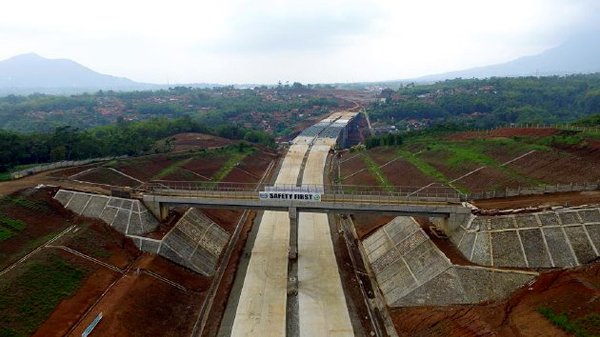High quality, sustainable infrastructure boosts B&R development
2019-10-10GoldenBeeZhang Xiang0

Zhang Xiang, Secretary-General of China International Contractors Association
Infrastructure is an indispensable condition for a country's economic development, social progress and life improvement. High-quality and sustainable infrastructure is the main pillar and foundation for achieving the goal of sustainable development in the world.
Infrastructure is the first step in implementing "the Belt and Road Initiative" (B&R Initiative); facilities are the most important among the five connectivities (policy coordination, connectivity of infrastructure, unimpeded trade, financial integration, and closer people-to-people ties). Realizing connectivity of infrastructure is the core content of the Belt and Road Initiative. On the Second Belt and Road Forum for International Cooperation held in April this year, Chinese President Xi proposed to construct high-quality, sustainable, resilient, affordable, inclusive and accessible infrastructure projects. This is highly consistent with the current international community's advocacy of the sustainable infrastructure and the practical needs of national economic and social development along the Belt and Road.
Infrastructure is the first step in implementing "the Belt and Road Initiative" (B&R Initiative); facilities are the most important among the five connectivities (policy coordination, connectivity of infrastructure, unimpeded trade, financial integration, and closer people-to-people ties). Realizing connectivity of infrastructure is the core content of the Belt and Road Initiative. On the Second Belt and Road Forum for International Cooperation held in April this year, Chinese President Xi proposed to construct high-quality, sustainable, resilient, affordable, inclusive and accessible infrastructure projects. This is highly consistent with the current international community's advocacy of the sustainable infrastructure and the practical needs of national economic and social development along the Belt and Road.

After 40 years of hard work, China has become a major country of international infrastructure construction. Chinese contractors have built a large number of infrastructure projects for relevant countries, such as highways, railways, ports, airports, power stations, communications, petrochemical, and municipal engineering, accumulating rich experience in project design, procurement and construction, etc. Chinese capital, Chinese equipment and Chinese technology have been widely recognized by the international community. The international competitiveness of Chinese contractors has been significantly enhanced. "Constructed by China" is becoming another bright card of our country in the international arena.
But at the same time, we should also be aware that the foreign contracting industry is facing higher and higher expectations from the host government, non-governmental organizations, and media, etc. In particular, during the implementation of infrastructure projects, Chinese enterprises need to make necessary improvements in safeguarding the rights and interests of employees, considering the demands of aborigines, protecting the ecological environment and practicing fair competition in order to conform to the general trend and atmosphere of international sustainable development. In other words, Chinese contractors need to invest in building sustainable infrastructure as their long-term development goals and direction.
But at the same time, we should also be aware that the foreign contracting industry is facing higher and higher expectations from the host government, non-governmental organizations, and media, etc. In particular, during the implementation of infrastructure projects, Chinese enterprises need to make necessary improvements in safeguarding the rights and interests of employees, considering the demands of aborigines, protecting the ecological environment and practicing fair competition in order to conform to the general trend and atmosphere of international sustainable development. In other words, Chinese contractors need to invest in building sustainable infrastructure as their long-term development goals and direction.
In order to adapt to the above development trend, China International Contractors Association (hereinafter referred to as CHINCA) continues to focus on the development of standards, capacity building, performance evaluation, brand promotion and international communication. In 2017, CHINCA issued the Guidelines of Sustainable Infrastructure for Chinese International Contractors, which guides and promotes the enterprises to invest in infrastructure projects that are economically, socially and environmentally sustainable. At the same time, the Eighth and Tenth International Infrastructure Investment and Construction Forum held by CHINCA in Macao set “sustainable infrastructure” as the theme of the forum, which effectively promoted the understanding and practice of high quality and sustainable infrastructure by the international parties.
At the 70th anniversary of the founding of the People's Republic of China, CHINCA is willing to continue to move forward, play the leading role as an industry organization, and cooperate with member enterprises and other partners to provide China's wisdom and China’s plan for the sustainable development of international infrastructure, and contribute to the in-depth implementation of the Belt and Road Initiative.
(Translated by GoldenBee, the Chinese version of this article is issued on China Sustainability Tribune wechat account)
(Images in this article are from the Internet)
At the 70th anniversary of the founding of the People's Republic of China, CHINCA is willing to continue to move forward, play the leading role as an industry organization, and cooperate with member enterprises and other partners to provide China's wisdom and China’s plan for the sustainable development of international infrastructure, and contribute to the in-depth implementation of the Belt and Road Initiative.
(Translated by GoldenBee, the Chinese version of this article is issued on China Sustainability Tribune wechat account)
(Images in this article are from the Internet)
Best Practices
- The 100-year brand — Air Liquide also has a sense of juvenile
- Beijing Public Transportation Corporation: Developing green transportation to build a harmonious and livable capital
- CGN: Building a modern factory in barren deserts and developing a new win-win cooperation model along “Belt and Road”
Upcoming Event

All the materials on the site “Source: XXX (not from this site)” have been reprinted from other media. They do not imply the agreement by the site.
All the materials with “Source: CSR-China Website” are the copyright of CSR-China Website. None of them may be used in any form or by any means without permission from CSR-China Website.
GoldenBee Official WeChat
Copyright © Csr-china.net All Right Reserved.
京ICP备19010813号










